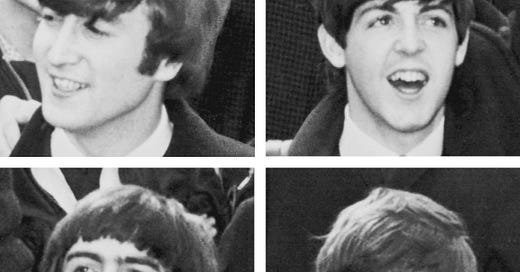I didn’t watch Kendrick Lamar’s halftime performance at the Super Bowl yesterday. The first half of the game was so underwhelming that I decided to take a break. But, just as we should have expected, opinions about the halftime show varied. That’s not surprising.
With so many ways to distribute elements of pop culture, the idea of a mainstream culture is dead. We no longer have only three television stations, or radio stations that act as musical gatekeepers. Our consumption of artistic expression is so splintered that we’ll never again have the sort of cultural coalescence around something the way that we used to have for The Tonight Show with Johnny Carson, or the series finale of M*A*S*H, or the mystery of Who Shot JR? We all create our own cultures for ourselves.
And although the crowd in the Superdome seemed on board with Lamar’s performance, it was nothing like attending an actual Kendrick Lamar concert would be. The difference in crowd reaction between people in attendance to watch a football game and those in attendance to watch Kendrick Lamar is monumental.
But I read so much over-the-top annoyance and dismissiveness – especially from the MAGA class – about Lamar’s performance that I decided to go back and watch it. And as I watched his performance and thought about the comments from those who dismissed or denigrated his performance, I realized that Kendrick Lamar is the new Beatles.
I’m not going to compare The Beatles and Kendrick Lamar musically. I know nothing about music other than I like it. And I like it best when I allow myself to engage with it free of preconceived notions. Some of my favorite songs and albums weren’t played on the radio, and without hearing the opinions of others I formed my own opinions. And art doesn’t stand up well to comparison anyway. Who’s to say this song is better than that one? Or this movie is better than that one? (Except for Jaws – that’s better than all of them!)
But reading the responses to Lamar’s performance from people like Matt Gaetz, Lauren Boebert, Ben Shapiro, and countless commenters on various social media posts, I couldn’t help but see the correlation between anger toward Kendrick Lamar’s performance and a general endorsement of the MAGA myth. (Which is the idea that America used to be great and something has happened to make it not great, and all we have to do is unchange the things that have changed and we’ll be great again.)
The halftime hatred reminded of The Beatles. It’s not too much of a jump to imagine the reaction to Kendrick Lamar being similar to the reaction that the World War II generation had when The Beatles arrived in 1964. These long-haired guys rebelled against the short, army-like crew cuts that were popular in the US at the time. They song rock and roll instead of American standards. Girls screamed and fainted at their shows. They came to symbolize the rejection of conformity, and signaled that a new time of more open expression had arrived. In short, they upset the established dominant culture.
And when people like Ted Nugent say “hey Kendrick Lamar you suck,” or a right-wing Twitter troll says, “Hey NFL, Trump won. We no longer let talentless mumbling pagan satanic cultists do halftime shows and pretend like people like it” or a New York Times Facebook page commenter says, “The worst ever. Disgrace.” their reaction is essentially the same that the previous dominant culture had when The Beatles arrived.
The irony is that if you described a musician who lived in section 8 housing as a kid, converted to Christianity as a teen, graduated high school with straight A’s, won a Pulitzer Prize, and lived a teetotaling, drug-free life, MAGA would hold them up as a world class example of the American dream. They wouldn’t express their scorn until you explained that you were talking about a black hip-hop artist named Kendrick Lamar.
I don’t know Kendrick Lamar’s music for one simple reason: I’ve always assumed that it’s not for me. I assumed that without listening to it. And, in all likelihood, he’s not making music with a forty-six-year-old mediocre white guy in mind. But after watching his halftime performance, I’m going to listen to him and see what I can learn, understand, or maybe just enjoy.
I was recently talking with a long-time friend and I asked him if he’d been to Lollapalooza since we’d gone to see Pearl Jam in 2007 when we were twenty-nine. And he said no, and he had no plans to go because Lollapalooza isn’t for us anymore. It’s for younger people, the next generation. And I get the feeling that those who instinctively hated Kendrick Lamar’s performance are having a tough time coming to the same realization, that the world has passed them by. The culture that they think should dominate is no longer dominant.
The America that MAGA wants to go back to never existed. But if it did exist, it’s gone. We shouldn’t and can’t go back to a world where white male is the default for everything, and marginalized people are left to fend for themselves. Those policies didn’t make America great.
The only chance that America has of actually being great is embracing its diversity, confronting its problems, giving a voice to those who haven’t been heard before, and preserving opportunity so that a kid from Compton still has the opportunity to someday perform at the Super Bowl halftime show.





